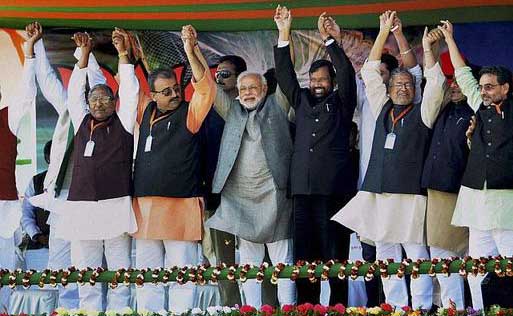Muzaffarpur, Mar 4: Lok Jan Shakti Party (LJP) president Ram Vilas Paswan cemented his renewed alliance with the BJP by addressing Gujarat Chief Minister Narendra Modi as “Vikas Purush (man of development)” and “future Prime Minister” at a rally in Muzaffarpur district in Bihar on Monday.
Sharing the dais with the prime ministerial candidate of the National Democratic Alliance (NDA), Mr. Paswan, who resigned from the Atal Bihari Vajpayee government in the wake of the 2002 Gujarat riots, denied the charge of communalism levelled against Mr. Modi.
“At present, Gujarat is a State where there has been no communal incident since 2002, whereas in Bihar, there is one every month. There is no rigid caste structure today. Everyone has become one community. India is a garden with floral variety. The person who tends all the flowers is a good gardener,” he said.
The rally showcased the NDA’s strength in Bihar, where the LJP and the Rashtriya Lok Samata Party of the Other Backward Classes leader Upendra Kushwaha are in alliance with the BJP. Coming together for the first time on a political platform, Mr. Paswan and Mr. Modi backed each other against the criticisms levelled against them.
Countering the criticism from Chief Minister Nitish Kumar and Rashtriya Janata Dal president Lalu Prasad, Mr. Paswan said, “When I was with them, they gave me a certificate of virtue. Now that I am with the NDA, I have suddenly become a bad person.”
Mr. Modi said Mr. Paswan lacked hypocrisy in dealing with his political opponents. “There is no place for hypocrisy in democracy. Mr. Paswan left us (in 2002), but whenever we met, he interacted in a friendly manner. And if he was photographed with me, he did not shy away from the cameras,” Mr. Modi said in a veiled attack of the Bihar Chief Minister, who had expressed unease about sitting at the same table with him at a meeting in Delhi.
Mr. Modi said his critics had found “Satta ki jadibuti [medicine for power]” in the narrative of secularism.
“Every time we talk of unemployment, inflation, food security, farmers, they say secularism is in danger. Theirs is a fraudulent argument. They have no answer for, or commitment to, these issues. For them, secularism is an election slogan, vote-bank politics, appeasement of a few and justice for none, and putting religion first. For us, secularism means politics of development for all, appeasement of none and justice for all,” he said.“The country’s politics is divided between Modi’s politics of stopping inflation, corruption and atrocities, and those who want to stop Modi.”
Criticising the third alternative of 11 parties, Mr. Modi said: “They rise only before an election. These ‘chunavi khiladi’ (poll players) spoil the election scenario and are never up to any good. Most of the parties of the front are trying to save the Congress,” he said.






Comments
Add new comment